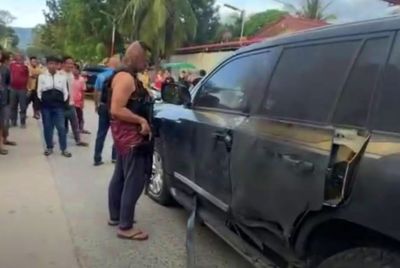Trump Used Her Daughter's Photo in Immigration Speech — Now This Mum Is Fighting Back: 'She Wouldn't Stand for This'
Denise Lorence challenges Operation Midway Blitz after her daughter Katie Abraham's image was used to justify immigration enforcement in Chicago

When Donald Trump displayed a photo of 24-year-old Katie Abraham during a 26 June immigration speech at the White House, it was meant to symbolise his administration's tough stance on illegal immigration. But for Katie's mother, Denise Lorence, the gesture was deeply upsetting. She says her daughter 'would never have stood for' being used in this way.
According to The Washington Post, Trump highlighted Katie's death to justify Operation Midway Blitz, a major enforcement drive in the Chicago area targeting roughly 2,300 undocumented immigrants in the first three months. The operation aimed to remove individuals deemed high risk but has also raised concerns about its wider impact on local communities.
From Personal Tragedy to Political Campaign
Katie Abraham was killed in January 2025 near Urbana, Illinois, when her car was struck by a vehicle driven by Julio Cucul Bol, a Guatemalan national identified as an undocumented immigrant. Bol attempted to flee by bus and was apprehended by U.S. Marshals.
The tragedy became a rallying point for Trump's renewed immigration agenda. In September, the Department of Homeland Security named its enforcement surge after her, calling it 'Operation Midway Blitz', describing it as a mission to 'honour Katie's memory' by removing dangerous offenders. According to DHS figures, the operation has already resulted in over 450 arrests in the Chicago suburbs.
Lorence said her daughter would never have supported this political use of her story. 'Katie can't stand up and say, "I am not a political pawn,"' she wrote in an op-ed. 'She avoided confrontation and tension; she wouldn't want to be part of this campaign.' Her words highlight the tension between public policy messaging and private grief, especially when a family feels their loved one's memory is being used to advance political goals.
Family Divisions and Community Repercussions
Katie's parents are publicly divided on the operation. Her father, Joe Abraham, supports it, saying Katie 'would not sacrifice other people's lives to bring people in illegally.' Lorence strongly disagrees. 'I would never fault or question someone in the way they grieve,' she said. 'But whether or not you agree with Operation Midway Blitz is not the story I'm here to tell. I am here to tell the story of who Katie was.'
Katie's memory, according to her mother, represents a life of kindness and creativity in Chicago—a city she loved for its diversity and sense of safety. Lorence hopes to reclaim that image from what she sees as political distortion.
Meanwhile, the wider community has felt the effects of Operation Midway Blitz. Civil rights advocates report that over 15,000 immigrant families in the Chicago area have experienced disruption, with children becoming fearful and families avoiding public spaces and school events. Protests, including weekly demonstrations in Chicago and surrounding suburbs, have emerged as community leaders balance calls for law enforcement with protecting vulnerable populations.
The Financial and Policy Scale of Enforcement
Since returning to office, Trump has made immigration enforcement central to his second-term agenda. His administration has issued 12 new executive orders, increased detention funding by £120 million ($145 million), and directed agents to target migrants even without criminal records.
This scale of investment demonstrates a significant push for enforcement but also raises ethical and social concerns.
The use of Katie Abraham's image has sparked debate about how political figures employ personal tragedies in messaging. While some residents support stricter enforcement, many families feel that focusing on punitive measures overlooks the human cost. Lorence's advocacy emphasises the importance of separating personal grief from policy, ensuring that individuals' memories are not exploited to justify actions they wouldn't have supported.
A Mother's Fight to Protect Her Daughter's Legacy
For Lorence, the issue is about dignity and respect, not politics. 'Katie would not want to be associated with an operation that targets Chicago,' she said. 'She would not have wanted to see children watch their parents being detained on their way to school.' Her public statements have resonated with families and activists who believe grief should never be instrumentalised to further political aims.
As Katie Abraham's image continues to circulate in government materials, her mother's voice offers a quiet act of defiance and a reminder that behind every headline is a real person and a grieving family. 'This is my daughter's story, not theirs to tell,' Lorence said.
The case underscores broader ethical questions about the use of personal tragedy in political campaigns and public policy advocacy.
© Copyright IBTimes 2025. All rights reserved.




















